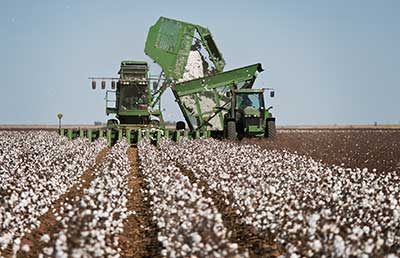Section 1031 Exchanges Can Be Tricky

Most farmers understand that trading in equipment with a dealer for new equipment usually does not result in any gain or loss. For example, assume a farmer purchases a tractor for $100,000 and fully depreciated it down to zero. He then trades-in the tractor at the local equipment dealer for a new tractor costing $200,000 and a trade-in value of $50,000. The traded-in equipment results in a gain of $50,000 that is not recognized and the basis in the new tractor is now $150,000. This is a straight-forward trade. However, it gets much trickier when there is a “delay” between the two deals.
I get at least a couple of phone calls each year that go similar to the following conversation:
Client – “Hey Paul, I just sold some land for $500,000 and I know that I can roll over the gain into some new property.”
Me – “Did you get your cash already?”
Client – “Yes, I did. Why, does that matter?”
Me – “Yes. Once you get the cash, you can no longer do a tax-deferred exchange under Section 1031.”
So, let’s review how a delayed tax-deferred exchange works:
- First, you must exchange like property for like property. With real estate, you generally can roll over the gain into other types of real estate. Farm land for apartment buildings, etc. However, if there is a fair amount of Section 1245 property (irrigation equipment, hog confinement building, etc.) on the property, that has to be rolled over into similar property. That can mess up some farm land exchanges.
- Second, you need to use some type of facilitator to accomplish the exchange. This entity must receive the cash from the sale of the relinquished property and purchase the replacement property.
- Third, you must make sure to reinvest the net sales price into the new property and all of the cash received in the exchange. Many taxpayers assume they only need to reinvest the cash.
- Fourth, it is difficult to do an exchange with a related party. There are several tricky steps that must occur that are beyond the scope of this post.
- Fifth, you only have 45 days to identify the property you want to acquire and 180 days TOTAL to do the exchange. There are no extensions on these dates including weekends or holidays.
If you follow these steps, you should have a valid exchange. If not, you will not like that phone call with during tax season.
Conclusion – If you are looking at doing any type of exchange, please make sure to call your tax advisor before you sign any documents.
Paul Neiffer is a certified public accountant and business advisor specializing in income taxation, accounting services, and succession planning for farmers and agribusiness processors. Paul is a principal with CliftonLarsonAllen in Walla Walla, Washington, as well as a regular speaker at national conferences and contributor at agweb.com. Raised on a farm in central Washington, he has been immersed in the ag industry his entire life, including the last 30 years professionally. Paul and his wife purchase an 180 acre ranch in 2016 and enjoy keeping it full of animals.

Hi, Paul.
You may not remember me, but JL Guinchard and I attended a CLA meeting in Seattle last Spring… Just a word to say I appreciate your Blog and your dedication to producers. These are some of the best people I have worked with for more than 35 years. When you wrote about calls from some who took the cash and negated the 1031 prospect, it reminded me of an experience several years back. One of the advisors I supervised in another state called, knowing my responsibility for 1031s. Like you, my first question was where the money was… After the advisor checked, he discovered it was in the Farmer’s bank; opportunity lost. Bad enough, however, a little more color is instructive. You see, the Farmer had been told by his CPA that he could do a tax-deferred exchange. The CPA failed to tell him that he couldn’t touch the money, that it had to be received by a Qualified Intermediary – or who was eligible to serve as a Qualified Intermediary. (There are prohibitions there too). The outcome was that the Farmer paid six figures in taxes — and fired the CPA. Thought this actual history would be of interest. Keep up the good work. We at Silver Portal Capital greatly appreciate our relationship with CLA. Very Best, David